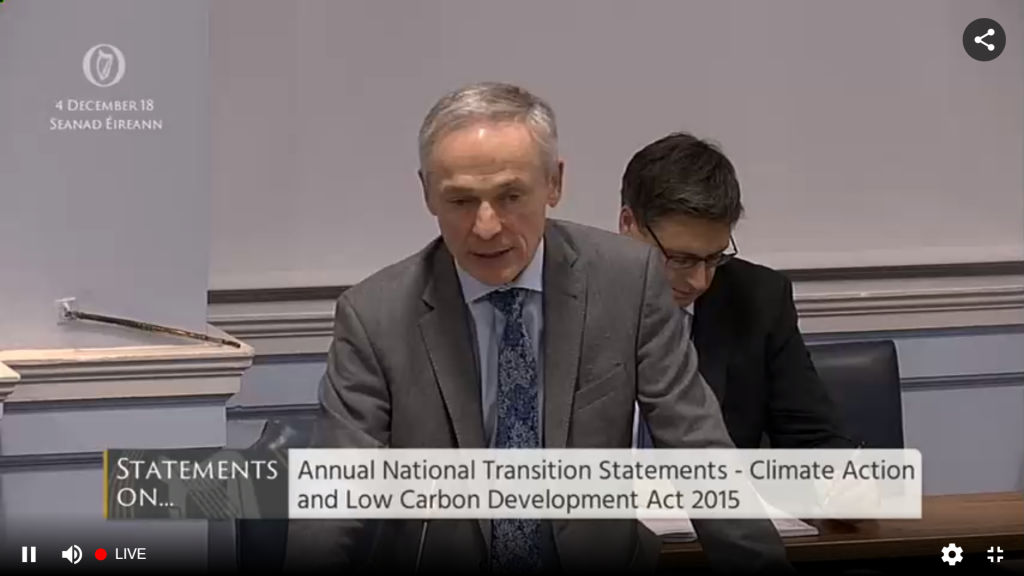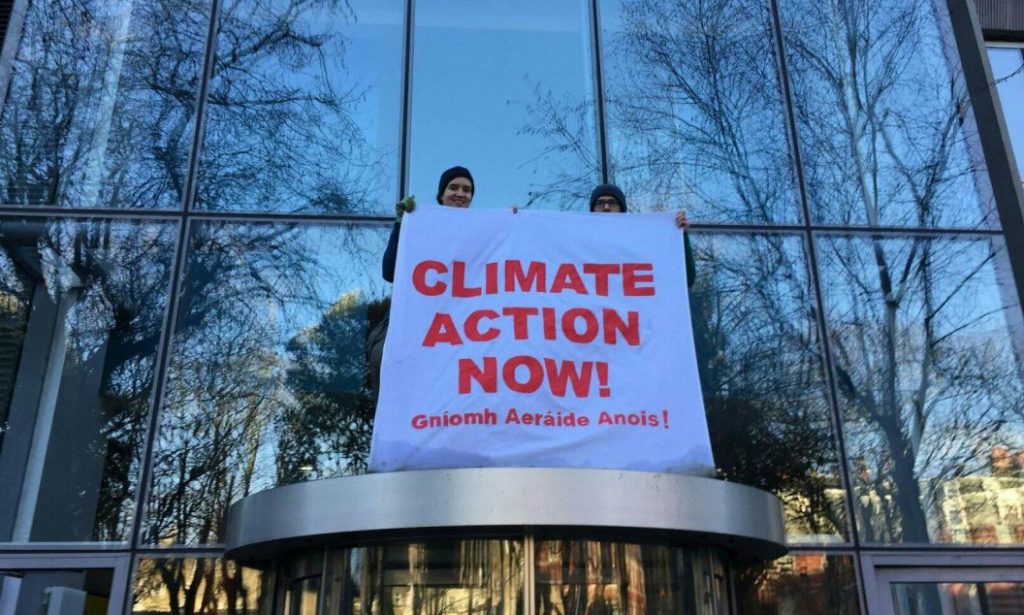Revenue neutral carbon tax the way forward

December 20th, 2018
A revenue-neutral carbon tax can help ensure that lower-income families are not financially hit in the low-carbon transition, the chair of the Special Joint Oireachtas Committee on Climate Action has said.
Speaking at the launch of the Government’s draft National Energy and Climate Plan (NECP) yesterday, Hildegarde Naughton TD said that the committee is examining ways in which it may increase the tax, currently set at €20 per tonne.
The 22 cross-party committee will report by the end of January on the policy direction that the Government needs to go in order to try and reach its targets for 2030 and beyond. It is already accepted that we will miss our 2020 EU targets.
While not wishing to pre-empt the committee’s decisions, Ms Naughten said she believes that an increased tax should be “revenue neutral” so that we “avoid disenfranchising people who are more disadvantaged”.
This is vital in light of recent protests across France over the distribution of wealth that were sparked by recent increases in fuel costs, she said.
“We don’t want where those who are less well-off are not able to make that [climate] transition,” she added. “There has to be an incentive for people to make new choices in relation to a lower carbon economy.”
Also speaking at the launch, the Minister for Climate Action, Richard Bruton TD said that there is clear consensus among many parties that “we need a trajectory” toward a higher carbon tax.
“There is very clearly an emerging consensus that we need to nail down that when you emit carbon you are creating an adverse impact on other people and that you should pay for it,” he said.
Mr Bruton signed a commitment to work together with other European countries on more ambitious carbon pricing measures – including carbon tax – at the recent international climate summit in Poland.

Budget 2019
The State’s Climate Change Advisory Council (CCAC) wanted to see the tax bumped up to €30 per tonne in Budget 2019, with further increases up to €80 by 2030 and protections for those in fuel poverty.
The Environmental Pillar, a coalition of environmental NGOs, wanted to see the new rate set at €70 from 2019, rising by a further €5 year-on-year. At least half of the revenue, the coalition said, should go directly to citizens in a carbon dividend.
Although the Taoiseach said that Budget 2019 would likely include an increase in the carbon tax to €30, the proposed boost was dropped from the budget following last-minute cabinet discussions.
The CCAC said that it was “disappointment” with the decision. Political economist and member of the CCAC, Joseph Curtin, said in his personal capacity that the decision was both “shocking and depressing”.
Dublin City University climate expert Diarmuid Torney said that the postponement of the carbon tax increase marked “a low in Ireland’s response to climate change”.
National Energy and Climate Plan
According to Mr Bruton, the draft NECP” sets out a picture of where we’re at” now but contains very little new policy moves besides those previously outlined in the National Development Plan and the National Mitigation Plan.
Mr Bruton that a final plan will be produced in 2019 that will “reflect the submissions that have been made” in a recently completed public consultation. The final report, he said, will highlight the “policy changes that people are advocating [for]”.
“We will have a further consultation meeting in January where we will sit down with people and have sector by sector working groups,” Mr Bruton said.

Activists stage sit-in at DCCAE offices Photo: Young Greens Ireland
Not yet the revolution required
Oisín Coghlan of Friends of the Earth welcomed the Minister’s “honesty” that the draft document is “not yet the revolution” in climate action promised by the Government.
Mr Coghlan added that all of Mr Bruton’s frankness and fine words on Ireland’s climate record since taking over the Ministerial hot seat must now be followed up with a much stronger final plan.
“The Climate Action Plan he produces in early 2019 will have to be at least as strong as the Citizens’ Assembly recommendations, and have as many teeth as the Action Plan for Jobs, to ensure all Departments actually deliver on their commitments,” he said.
“The Minister also still has work to do to close the gap between his rhetoric and the positions his party and his Department take in practice [such as] not joining progressive EU members in backing higher ambition on emissions in line with the Paris Agreement.”
Mr Coughlan was referring to the decision by the Government not to join other European states at the recent climate summit in Poland in directly pledging to increase climate targets by 2020.
While the EU is a signatory, the Government did not sign up independently like many European counterparts such as Denmark, France, Germany, Italy, Portugal, Sweden and the United Kingdom.
During the summit, the coalition of 27 countries committed to stepping up their ambition in line with the long-term temperature goal of the Paris Agreement.
[x_author title=”About the Author”]







